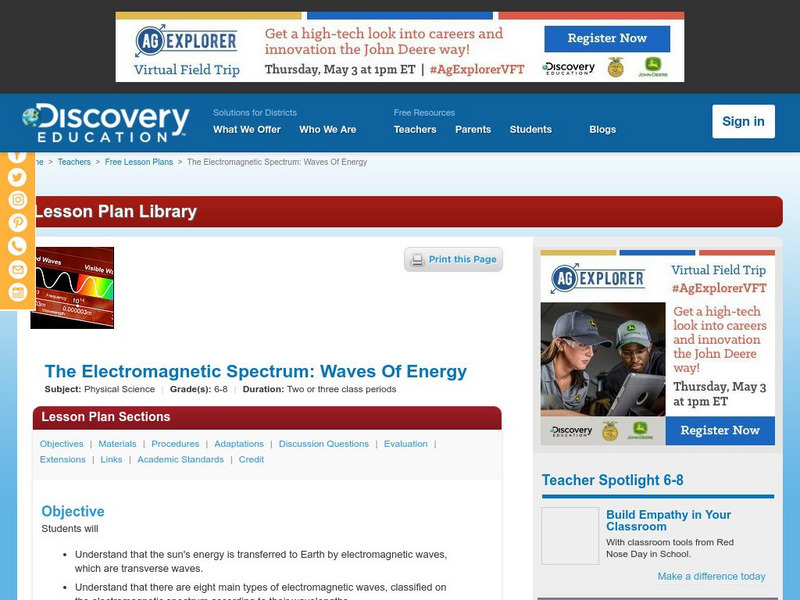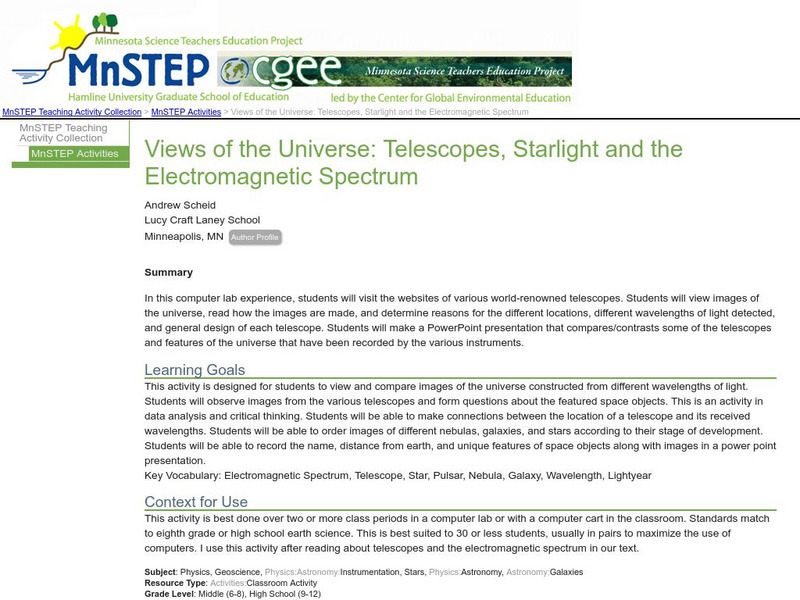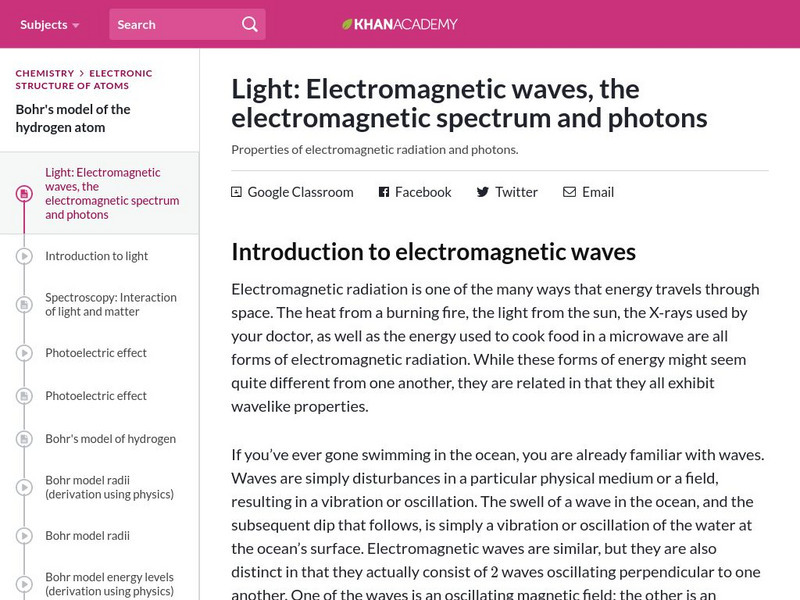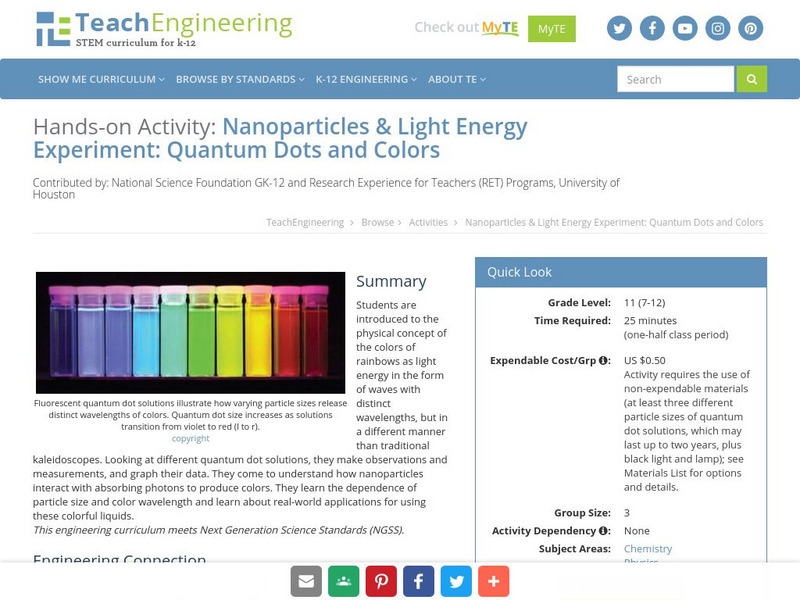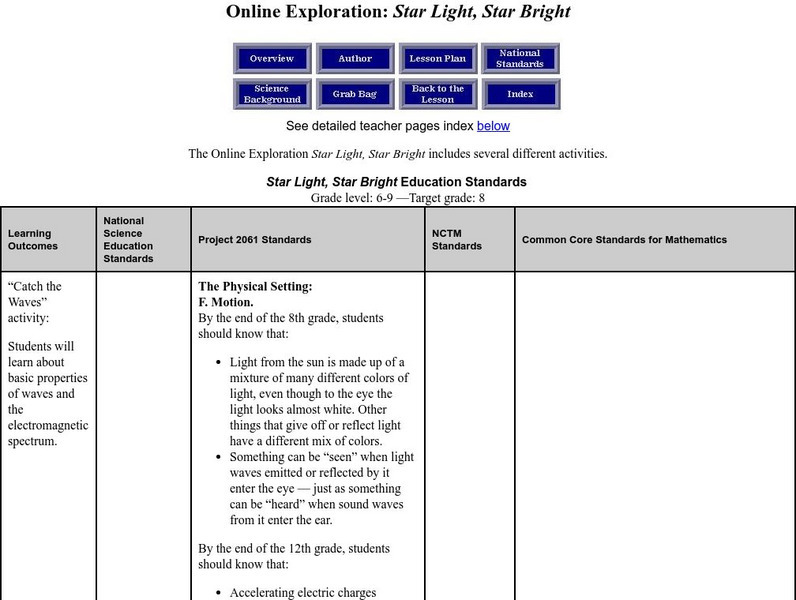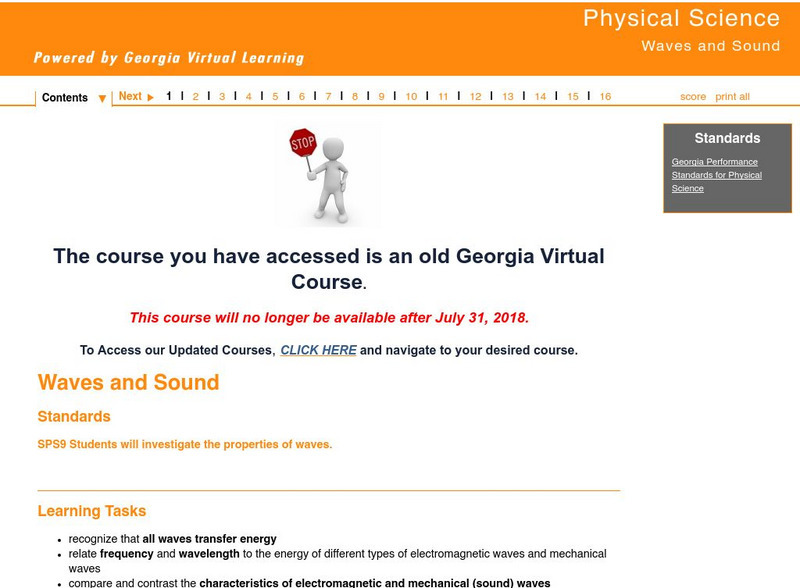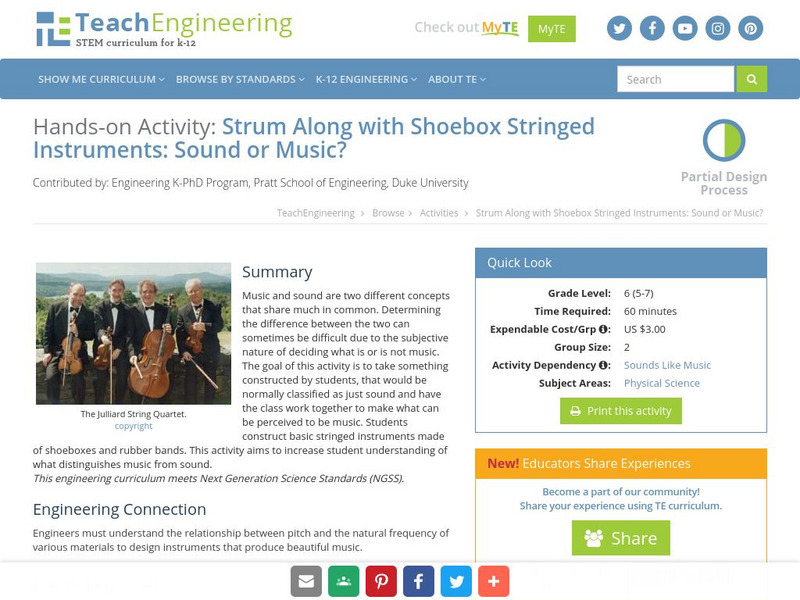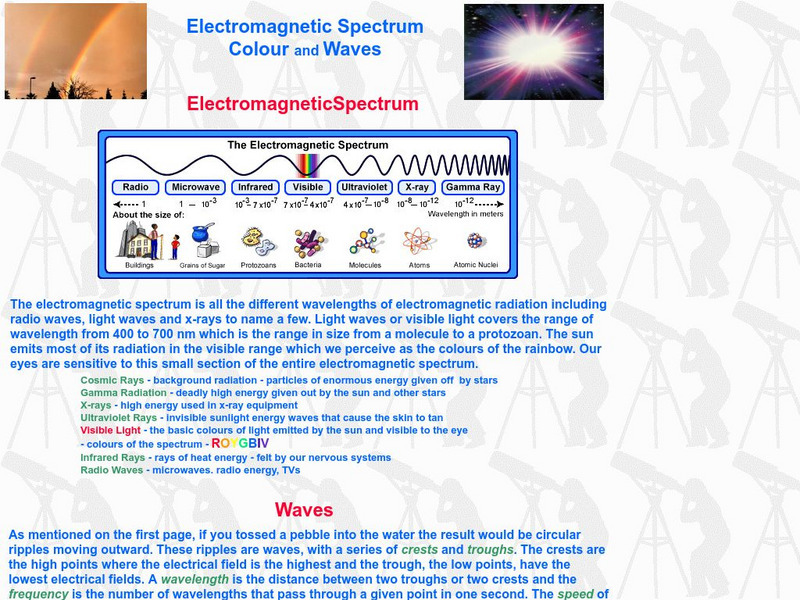Discovery Education
Discovery Education: The Em Spectrum: Waves of Energy
Students are introduced to the electromagnetic spectrum through this group research activity. Each group investigates a different wavelength range within the em spectrum and reports back to class. Discussion ideas also included.
NASA
Nasa: Tour of the Electromagnetic Spectrum: Visible Light
Visible light waves are the only electromagnetic waves we can see. We see these waves as the colors of the rainbow. Each color has a different wavelength. Red has the longest wavelength and violet has the shortest wavelength. When all...
NASA
Nasa: Imagers: The Electromagnetic Spectrum
NASA site provides information on waves, electromagnetic waves and their wavelengths.
Science Education Resource Center at Carleton College
Serc: Views of the Universe: Telescopes, Starlight, Electromagnetic Spectrum
Students visit the websites of various world-renowned telescopes, view images of the universe, read how the images are made, and determine reasons for the different locations, different wavelengths of light detected, and general design...
Science Struck
Science Struck: Wavelength of Visible Light Spectrum
Explains where visible light fits into the electromagnetic spectrum and the wavelengths for the different colors we see.
TeachEngineering
Teach Engineering: Checking the Surf
This lesson introduces the concepts of wavelength and amplitude in transverse waves. In the associated activity, students will use ropes and their bodies to investigate different wavelengths and amplitudes.
TeachEngineering
Teach Engineering: The Energy of Light
In this introduction to light energy, students learn about reflection and refraction as they learn that light travels in wave form. Through hands-on activities, they see how prisms, magnifying glasses and polarized lenses work. They also...
Khan Academy
Khan Academy: Electromagnetic Waves: The Electromagnetic Spectrum and Photons
An article that discusses the coupling of an electric field with a magnetic field to create electromagnetic waves. Article also discusses how different types of electromagnetic waves have different wavelengths which forms the...
PBS
Pbs Learning Media: Jewel Box Sun
See the sun like you have never seen it before! Using a specialized telescope, NASA developed images of the sun created from a wide range of wavelengths of light. Each wavelength is represented by a different color making a beautiful...
University of Colorado
University of Colorado: Ph Et Interactive Simulations: Models of the Hydrogen Atom
How did scientists figure out the structure of atoms without looking at them? Try out different models by shooting light at the atom. Check how the prediction of the model matches the experimental results.
TeachEngineering
Teach Engineering: Quantum Dots and Colors
Students are introduced to the physical concept of the colors of rainbows as light energy in the form of waves with distinct wavelengths, but in a different manner than traditional kaleidoscopes. Looking at different quantum dot...
Space Telescope Science Institute
Amazing Space: Star Light, Star Bright
This online exploration provides an opportunity to identify the different properties of waves and the relationship that exists between energy, wavelength, and frequency. Correlate images from the Hubble Telescope to the wavelength,...
TeachEngineering
Teach Engineering: Sound and Light
The Sound and Light unit provides students with an understanding of sound and light waves through the theme of the "Sunken Treasure," a continuous story line throughout the lessons. In Lessons 1-5, students learn about sound, and in...
Georgia Department of Education
Ga Virtual Learning: Physical Science: Waves and Sound
In this module, students investigate the properties and behavior of different types of waves.
TeachEngineering
Teach Engineering: Strum Along
Music and sound are two different concepts that share much in common. Determining the difference between the two can sometimes be difficult due to the subjective nature of deciding what is or is not music. The goal of this activity is to...
University of California
U.c. Berkeley: Spectra From Space
View the entire spectrum of electromagnetic radiation and get information on telescopes especially designed to view different wavelengths of the spectrum.
My Science Site
Electromagnetic Spectrum: Colour and Waves
This resource provides information on the different wavelengths that make up the electromagnetic spectrum. Also contains information on waves and color.
State University of New York
State University of New York: Atomic Absorption and Emission
This module simulates the excitation of hydrogen atoms through irradiation with electromagnetic radiation of different wavelengths.
CK-12 Foundation
Ck 12: Physical Science: Color
[Free Registration/Login may be required to access all resource tools.] Overview of the different colors in visible light and how they relate to its wavelength, how a prism separates visible light into its different colors, the colors of...
TeachEngineering
Teach Engineering: Graphing the Rainbow
Students are introduced to different ways of displaying visual spectra, including colored "barcode" spectra, like those produced by a diffraction grating, and line plots displaying intensity versus color, or wavelength. Students learn...
Georgia State University
Georgia State University: Hyper Physics: Mirrors in Imaging
A discussion from Georgia State University of different types of mirrors and the images which they create. Discusses different instruments which use mirrors to produce images.
Science Education Resource Center at Carleton College
Serc: Investigating Sound: Using Open Tubes to Demonstrate Beat Notes
In this interactive demonstration, students will observe while the teacher creates two sound frequencies using open tube resonators of nearly identical length. The nearness in length produces two slightly different frequencies which...
Physics Central
Physics Central: Physics in the Snow: Snowy Colors
A simple experiment through which students observe the connection between color and heat and prove that dark-colored objects and light-colored objects heat at different rates, even when exposed to the same heat or light source.
BBC
Bbc: Gcse Bitesize: Why Do Scientists Think That Light and Sound Are Waves?
Light travels as transverse waves and can travel through a vacuum. Sound travels as longitudinal waves and needs to travel through a solid, liquid or gas. Read about the properties of light and of sound, and learn the differences between...
